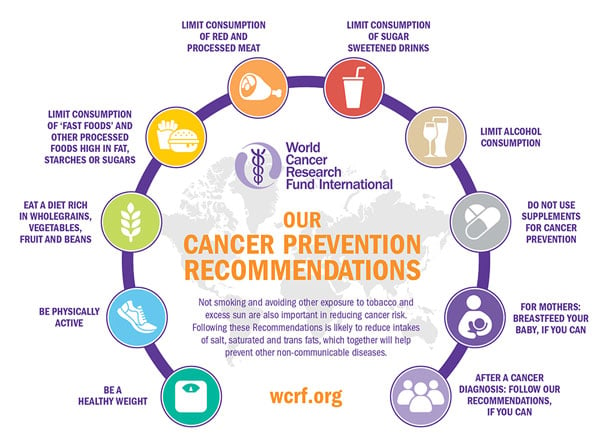 Keep your weight within the healthy range and avoid weight gain in adult life.
Keep your weight within the healthy range and avoid weight gain in adult life.
One of our Cancer Prevention Recommendations is to keep your weight within the healthy range and avoid weight gain in adult life.
There is strong evidence that greater body fatness causes many cancers, and this evidence has strengthened over the last decade.
There is strong convincing evidence that greater body fatness in adults is a cause of cancers of the oesophagus (adenocarcinoma), pancreas, liver, colorectum, breast (postmenopausal) and kidney.
Greater body fatness is also a convincing cause of endometrial cancer.
Greater body fatness is also probably a cause of cancers of the mouth, pharynx and larynx, stomach (cardia), gallbladder, ovary and prostate (advanced). Weight gain in adult life is a convincing cause of postmenopausal breast cancer.
Maintaining a healthy weight throughout life is one of the most important ways to protect against cancer. Overweight and obesity, generally assessed by BMI and waist circumference, are more prevalent than ever.
For some cancers, the increase in risk is seen with increasing body fatness even within the so-called ‘healthy’ range. Nevertheless, most benefit is to be gained by avoiding overweight and obesity. Overweight in childhood and early life is liable to be followed by overweight and obesity in adulthood.
BMI is a useful measure for most adults, but because the relationship between BMI and body composition varies between ethnic groups, different reference ranges have been proposed for Black and Asian populations.
BMI results may be less reliable for other groups of people, including:
This Recommendation can best be achieved by maintaining energy balance throughout life by:
Better and earlier diagnosis and treatment are critical in combating cancer, but we’re shutting the stable door after the horse has bolted if the factors that are fuelling cancer rates aren’t also addressed
– Dr Kate Allen, World Cancer Research Fund International’s Executive Director of Science & Public Affairs
Globally, the prevalence of overweight and obesity is high and in most countries it is rising. A whole-of-government, whole-of-society approach is necessary to create environments for people and communities that are conducive to being a healthy weight.
A comprehensive package of policies is needed to enable people to achieve and maintain a healthy weight, including policies that influence the food environment (how food is priced, marketed, sold and procured), food system (how food is produced), built environment (how accessible environments are for physical activity) and behaviour change communication across the life course. Browse our NOURISHING database for information on food policies that are being implemented around the world and find out more on policy action for cancer prevention.
Our Recommendations work together as an overall way of living healthily to prevent cancer.

In 2018, we produced the Diet and Cancer Report, the third in our series of major reports looking at the many ways in which our diets, and how active we are, affect our cancer risk. You can find out much more about our Cancer Prevention Recommendations by downloading a pdf of the relevant chapter in the 2018 report. Please note, however, that this webpage may have been updated since the report was published.